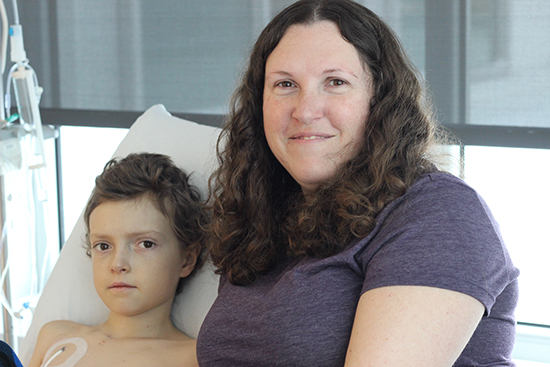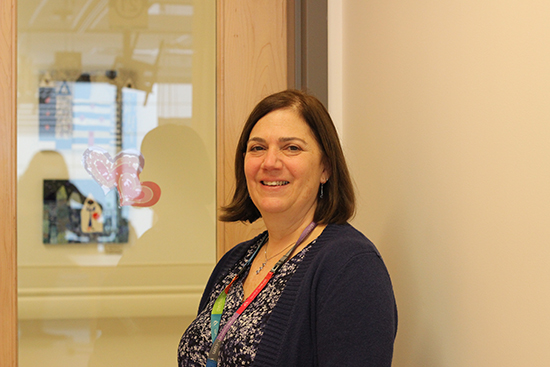Nine-year-old Sebastian Call was a happy-go-lucky kid who had been fighting acute myelogenous leukemia (AML)

By Gilda Salomone, MUHC Communications
When all treatments failed and time was running short for a boy diagnosed with leukemia, his doctor teamed up with the MUHC pediatric Research Ethics Board to come up with a made-to-measure study that brought back hope.
Nine-year-old Sebastian Call was a happy-go-lucky kid who had been fighting acute myelogenous leukemia (AML) – a type of cancer that starts in blood stem cells and more often affects adults – since February 2015.
“We went through the first phase of treatments at the Montreal Children’s Hospital (MCH) without problems or complications,” says Sebastian’s mother, Jennifer Wykes. “He went into remission for five months, but in April 2016 the cancer came back, so we had to start everything all over again.”
Sebastian underwent more chemotherapy and took part in a clinical trial that was testing a new medication for kids. Still, the cancer didn’t go away, and time was running short for the young patient.
“At that point, Sebby’s oncologist, Dr. Sharon Abish, told us about a clinical trial being carried out at the Royal Victoria Hospital with adults,” Jennifer says. “We were hopeful again.”
A phase I trial is often the first time a new drug or therapy is tested on humans for safety, tolerance, dosage and side effects. It may involve more risk for participants, and while

some patients may benefit from an early experimental treatment, many won’t. Researchers usually wait to see the results on adults before proceeding to phase I studies in children, but in Sebastian’s case, time was of the essence.
“We thought it would be a rational choice to try this new medication,” says Dr. Abish. “However, since it has just started being studied in adults, it is not yet available for children. We approached the company that makes the drug and Health Canada to see if there was a way that we could use it as a last resort for Sebastian.”
A one-patient study
The only way Health Canada would let Sebastian try the new drug was to create a clinical trial made to measure for him, modelled on the adult study. From that moment on, Dr. Abish worked in collaboration with the MUHC’s pediatric Research Ethics Board (REB), a diverse group of professionals who review and approve all research involving human participants. One of the REB’s main goals is to promote access to cutting edge clinical research while also ensuring participant’s safety and well-being. An important part of that is making sure patients or patients’ parents, in the case of children, make informed choices about participating in research.
“The informed consent is the cornerstone of clinical research trials,” says Lori Seller, co-chair of the MUHC’s pediatric REB. “We must reach a balance between giving as much information as necessary to the patients –what we are trying to learn, what procedures will be done, the risks, benefits, costs – and doing so in an understandable way. When you’re dealing with children, there’s always an extra layer of complexity, because we’re asking the parents to make a decision for their child.”
Given Sebastian’s parents’ interest in the trial, the wheels were set in motion to start the one-patient trial. Even though the MUHC team was acting quickly but thoroughly, for Jennifer and her husband Steve, the process was at times challenging.
“Dr. Abish told us that there would be a lot of steps involved and that it was a slow acting medication,” says Jennifer. “It was frustrating to have to wait, but we knew they were working hard for Sebastian to have access to the drug.”
“Our scheduled meeting to review new research protocols, which are written descriptions of trials, was still a few weeks away,” recalls Lori Seller, co-chair of the REB, “but Dr. Abish was worried that Sebastian was too sick to wait for the next meeting. Since the drug is slow to take effect, the sooner he could start the more chance there was that it might help him.”
Informed of the situation, REB members went beyond the call of duty. They gathered for an extraordinary meeting, reviewed and approved the protocol which was then sent to Health Canada for approval. Soon afterwards Sebastian started taking the medication.
“The process can be time consuming, onerous and frustrating, but the delays are caused by actions we must take to protect the patient and to make sure the research is ethical,” says Dr. Abish.
A turn for the worse
Sebastian’s treatment started in November. At first, it seemed to be working and the side effects were few, but in March, his health took a turn for the worse. He passed away on March, 14th. His young life may not have been saved, but with the knowledge gained from his involvement in this clinical trial, other children may one day benefit from a new treatment.
This story is dedicated to Sebastian Call and his parents, Jennifer Wykes and Steve Call, whose courage,
